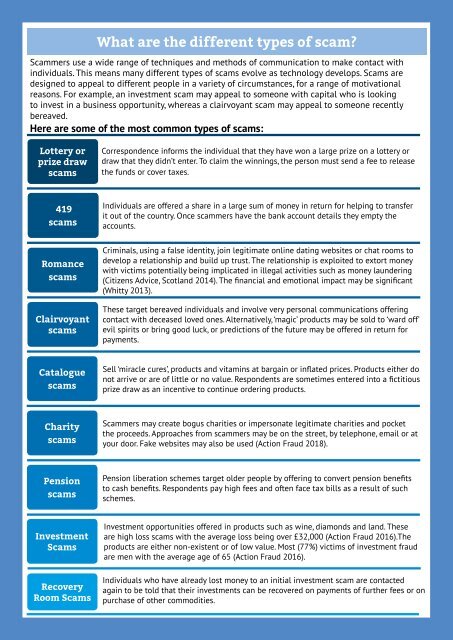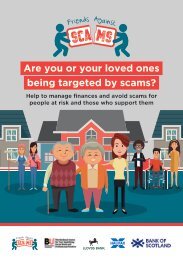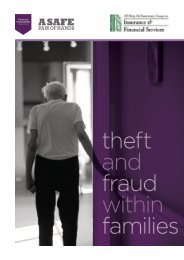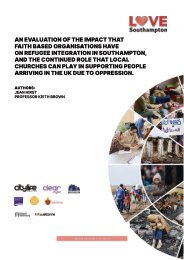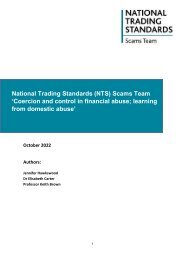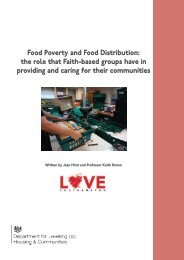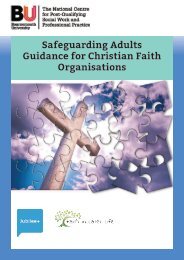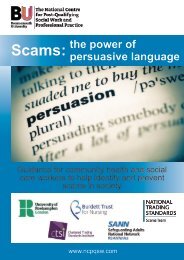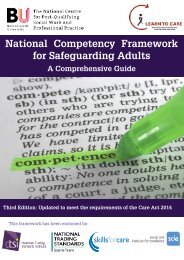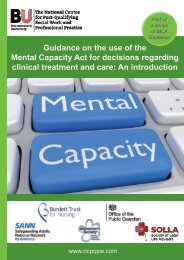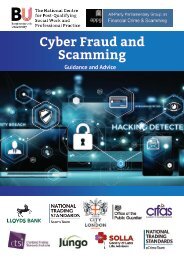Financial Scamming and Fraud
Financial scamming and its impact have been receiving a higher public profile in recent months, yet though it is recognised as a growing problem, there is a lack of clear research and evidence into the scale of the problem, its causes and the impact on the public.
Financial scamming and its impact have been receiving a higher
public profile in recent months, yet though it is recognised as a
growing problem, there is a lack of clear research and evidence
into the scale of the problem, its causes and the impact on the
public.
You also want an ePaper? Increase the reach of your titles
YUMPU automatically turns print PDFs into web optimized ePapers that Google loves.
What are the different types of scam?<br />
Scammers use a wide range of techniques <strong>and</strong> methods of communication to make contact with<br />
individuals. This means many different types of scams evolve as technology develops. Scams are<br />
designed to appeal to different people in a variety of circumstances, for a range of motivational<br />
reasons. For example, an investment scam may appeal to someone with capital who is looking<br />
to invest in a business opportunity, whereas a clairvoyant scam may appeal to someone recently<br />
bereaved.<br />
Here are some of the most common types of scams:<br />
Lottery or<br />
prize draw<br />
scams<br />
Correspondence informs the individual that they have won a large prize on a lottery or<br />
draw that they didn’t enter. To claim the winnings, the person must send a fee to release<br />
the funds or cover taxes.<br />
419<br />
scams<br />
Individuals are offered a share in a large sum of money in return for helping to transfer<br />
it out of the country. Once scammers have the bank account details they empty the<br />
accounts.<br />
Romance<br />
scams<br />
Clairvoyant<br />
scams<br />
Criminals, using a false identity, join legitimate online dating websites or chat rooms to<br />
develop a relationship <strong>and</strong> build up trust. The relationship is exploited to extort money<br />
with victims potentially being implicated in illegal activities such as money laundering<br />
(Citizens Advice, Scotl<strong>and</strong> 2014). The financial <strong>and</strong> emotional impact may be significant<br />
(Whitty 2013).<br />
These target bereaved individuals <strong>and</strong> involve very personal communications offering<br />
contact with deceased loved ones. Alternatively, ‘magic’ products may be sold to ‘ward off’<br />
evil spirits or bring good luck, or predictions of the future may be offered in return for<br />
payments.<br />
Catalogue<br />
scams<br />
Sell ‘miracle cures’, products <strong>and</strong> vitamins at bargain or inflated prices. Products either do<br />
not arrive or are of little or no value. Respondents are sometimes entered into a fictitious<br />
prize draw as an incentive to continue ordering products.<br />
Charity<br />
scams<br />
Scammers may create bogus charities or impersonate legitimate charities <strong>and</strong> pocket<br />
the proceeds. Approaches from scammers may be on the street, by telephone, email or at<br />
your door. Fake websites may also be used (Action <strong>Fraud</strong> 2018).<br />
Pension<br />
scams<br />
Pension liberation schemes target older people by offering to convert pension benefits<br />
to cash benefits. Respondents pay high fees <strong>and</strong> often face tax bills as a result of such<br />
schemes.<br />
Investment<br />
Scams<br />
Investment opportunities offered in products such as wine, diamonds <strong>and</strong> l<strong>and</strong>. These<br />
are high loss scams with the average loss being over £32,000 (Action <strong>Fraud</strong> 2016).The<br />
products are either non-existent or of low value. Most (77%) victims of investment fraud<br />
are men with the average age of 65 (Action <strong>Fraud</strong> 2016).<br />
Recovery<br />
Room Scams<br />
Individuals who have already lost money to an initial investment scam are contacted<br />
again to be told that their investments can be recovered on payments of further fees or on<br />
purchase of other commodities.


